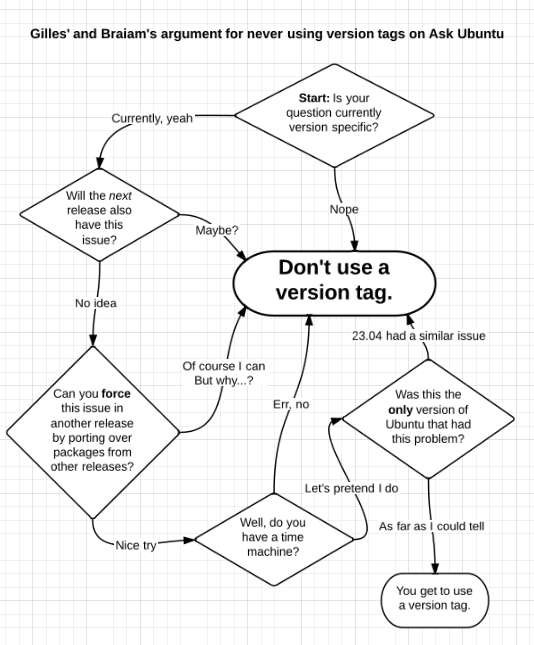No, sorry, you're completely wrong here. Before I explain why, just for anybody else watching, this is about my question here and seems to have since dissolved into an argument about version tags... It must be a day that ends in Y.
I'm going to start with a quick summary of my arguments (past and present), then an explanation on how that applies to my question and then an round up of counters to arguments made against these.
- Version tags —with Jeff's blessing— are there to highlight questions linked to specific versions.
- I'm not arguing that every issue has to have a version tag and I'm certainly against things only having a version tag.
- There is no limit on which tags you use together. If a question is about two things, tag it accordingly. That includes versions. This is just how folksonomy works.
- Unless it already isn't, you can't know something isn't version specific until you've tried every version ever made (including future releases). Your subtractive approach helps nobody if that problem does later turn out to be a version specific issue.
So the question under scrutiny...
I had a problem with the 14.04 version of the bash-completion package. The apt command (new to 14.04) doesn't have a completion file in the right place so you can't use Tab to auto-complete things. I was wondering if there was a quick way to enable similar behaviour to apt-get and apt-cache.
The problem is caused by bash-completion being behind the curve. It's not a bug; they just haven't written the file yet (probably because the apt command is still maturing). Even the latest Debian version doesn't have an apt file yet. Trusty is in freeze so it's unlikely that a fix will be brought in. And given the way SRUs work, seems likely this will be a problem for Trusty users for some considerable time.
Again, this is specific to 14.04 because 14.04 is the only release that has this issue.
Might the issue exist in future releases? Who knows! More importantly, who cares? The question is and will always be an issue I had with 14.04. It might go onto apply for other things and if that's the case we can look at the tagging again.
Isn't that just a bug in bash-completion in a dev release?
As I highlighted above, it's a problem (with a workaround) that will outlive the development period of Trusty. Unless somebody wants to do some serious SRUing, this is an issue that will be around for five years.
How do you ever know something is version specific?
Do your best. If you suspect it to be version specific, add the tag. If you can show it's not, remove it. Don't shoot on sight.
This is contrary to the approach being suggested in and under Gilles' answer. I've boiled that down to a flow diagram so you can see what the argument there really is: "Never use version tags"

This was made with tongue firmly in cheek but I mean it. We have version tags. Let's use them when they apply and not worry too much if we're slightly over-inclusive with them. Put more emphasis on getting the other tags as good as possible.
If you're worried about tagging, focus on making sure something has all the tags that definitely do apply rather than quibbling over tags that might not apply.

